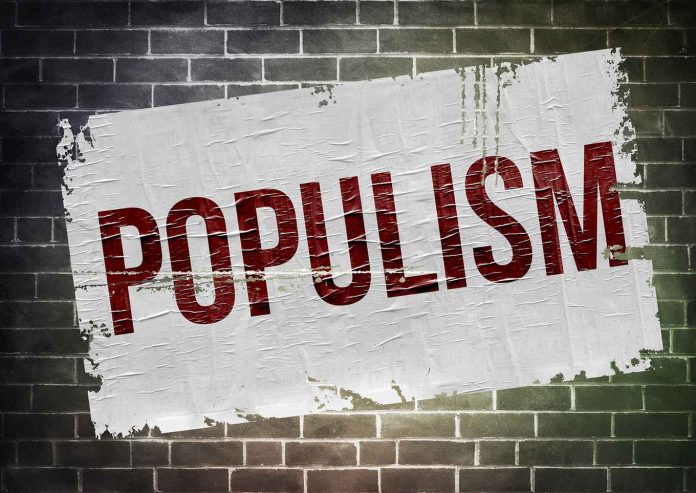Populism has emerged as a potent force in contemporary politics, characterised by its appeal to the ordinary people and its opposition to the elite. Central to many populist movements is the use of lies, misinformation, and deceptive rhetoric. This article explores the relationship between populism and lies, analysing how deceit is employed as a strategic tool to galvanise support, undermine opponents, and reshape political landscapes.
Populism is a political approach that strives to appeal to ordinary people who feel their concerns are disregarded by established elite groups. It often involves charismatic leaders who claim to represent the ‘will of the people’ against the corrupt and self-serving elite. Populist leaders frequently position themselves as outsiders, regardless of their background, to tap into the frustrations and aspirations of the masses. Hence, very wealthy people like Donald Trump and Nigel farage are currently leading the populist charge.
Lies and misinformation are instrumental in populist strategies for several reasons. Firstly, they serve to simplify complex issues, providing clear, albeit false, explanations that are easily digestible by the general public. By reducing the intricacies of political, economic, and social problems to black-and-white narratives, populist leaders can more effectively mobilise support.
For instance, populist rhetoric often includes exaggerated or entirely fabricated claims about the threat posed by immigrants, crime rates, or economic instability. These claims exploit existing fears and prejudices, creating a sense of urgency and crisis that necessitates the populist leader’s intervention. The use of such lies not only galvanises the base but also distracts from more nuanced discussions that might reveal the impracticality or dangers of populist policies.
Populism thrives on the creation of a stark ‘us versus them’ dichotomy. Lies are essential in constructing and maintaining this division. Populist leaders often fabricate or distort facts to demonise their opponents and portray themselves as the sole champions of the people. By vilifying the elite and other out-groups—such as political opponents, immigrants, or minority communities—populists foster a sense of unity and purpose among their followers.
This divisive strategy is evident in the rhetoric of leaders like Donald Trump in the United States, who has consistently employed falsehoods to cast the media, political establishment, and certain demographic groups as enemies of the people. Such tactics not only consolidate the leader’s support but also undermine trust in independent institutions, paving the way for greater authoritarian control.
The proliferation of lies within populist movements has far-reaching consequences for democratic societies. One significant impact is the erosion of truth and factual discourse in the public sphere. When political debates are dominated by falsehoods and conspiracy theories, it becomes challenging for citizens to make informed decisions. This degradation of public discourse weakens democratic institutions, as the line between reality and fabrication blurs.
Moreover, the reliance on lies fosters a culture of cynicism and distrust. When leaders are repeatedly exposed as dishonest yet face no accountability, it undermines public faith in the political system. This disillusionment can lead to apathy, decreased political participation, and even radicalisation, as people seek alternative means to express their dissatisfaction.
Addressing the challenge posed by populism and lies requires a multifaceted approach. Firstly, there is a need for robust and independent media that can fact-check and expose falsehoods. Media literacy programs are also crucial, equipping citizens with the skills to critically evaluate information sources and resist the lure of sensationalist misinformation.
Additionally, political leaders and institutions must work to rebuild trust by promoting transparency, accountability, and inclusivity. This involves not only countering populist narratives with factual information but also addressing the legitimate grievances that populist leaders exploit. Economic inequality, social injustice, and political disenfranchisement must be tackled to reduce the appeal of populist rhetoric.
Populism and lies are deeply intertwined, with deceit serving as a critical tool for populist leaders to mobilise support and consolidate power. While this dynamic poses significant threats to democratic governance and societal cohesion, it also underscores the need for vigilant and informed citizenry, as well as resilient democratic institutions. By promoting truth, transparency, and accountability, societies can resist the corrosive influence of populism and lies, ensuring a healthier and more democratic political environment.
KEEP US ALIVE and join us in helping to bring reality and decency back by SUBSCRIBING to our Youtube channel: https://www.youtube.com/channel/UCQ1Ll1ylCg8U19AhNl-NoTg AND SUPPORTING US where you can: Award Winning Independent Citizen Media Needs Your Help. PLEASE SUPPORT US FOR JUST £2 A MONTH https://dorseteye.com/donate/







